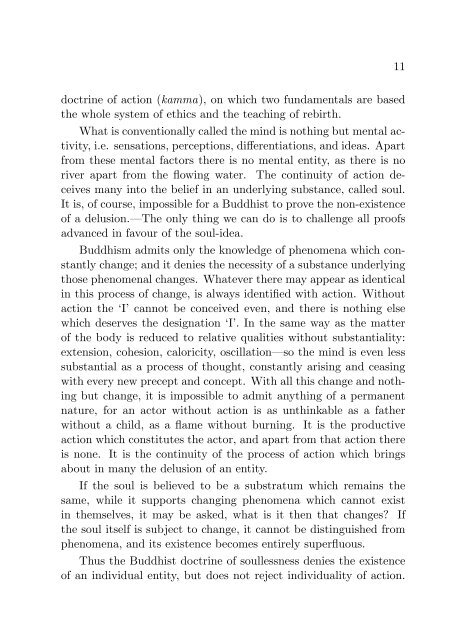Towards the Truth
Notes from a three-day debate in the 1940’s about Buddhism and Christianity.
Notes from a three-day debate in the 1940’s about Buddhism and Christianity.
You also want an ePaper? Increase the reach of your titles
YUMPU automatically turns print PDFs into web optimized ePapers that Google loves.
11<br />
doctrine of action (kamma), on which two fundamentals are based<br />
<strong>the</strong> whole system of ethics and <strong>the</strong> teaching of rebirth.<br />
What is conventionally called <strong>the</strong> mind is nothing but mental activity,<br />
i.e. sensations, perceptions, differentiations, and ideas. Apart<br />
from <strong>the</strong>se mental factors <strong>the</strong>re is no mental entity, as <strong>the</strong>re is no<br />
river apart from <strong>the</strong> flowing water. The continuity of action deceives<br />
many into <strong>the</strong> belief in an underlying substance, called soul.<br />
It is, of course, impossible for a Buddhist to prove <strong>the</strong> non-existence<br />
of a delusion.—The only thing we can do is to challenge all proofs<br />
advanced in favour of <strong>the</strong> soul-idea.<br />
Buddhism admits only <strong>the</strong> knowledge of phenomena which constantly<br />
change; and it denies <strong>the</strong> necessity of a substance underlying<br />
those phenomenal changes. Whatever <strong>the</strong>re may appear as identical<br />
in this process of change, is always identified with action. Without<br />
action <strong>the</strong> ‘I’ cannot be conceived even, and <strong>the</strong>re is nothing else<br />
which deserves <strong>the</strong> designation ‘I’. In <strong>the</strong> same way as <strong>the</strong> matter<br />
of <strong>the</strong> body is reduced to relative qualities without substantiality:<br />
extension, cohesion, caloricity, oscillation—so <strong>the</strong> mind is even less<br />
substantial as a process of thought, constantly arising and ceasing<br />
with every new precept and concept. With all this change and nothing<br />
but change, it is impossible to admit anything of a permanent<br />
nature, for an actor without action is as unthinkable as a fa<strong>the</strong>r<br />
without a child, as a flame without burning. It is <strong>the</strong> productive<br />
action which constitutes <strong>the</strong> actor, and apart from that action <strong>the</strong>re<br />
is none. It is <strong>the</strong> continuity of <strong>the</strong> process of action which brings<br />
about in many <strong>the</strong> delusion of an entity.<br />
If <strong>the</strong> soul is believed to be a substratum which remains <strong>the</strong><br />
same, while it supports changing phenomena which cannot exist<br />
in <strong>the</strong>mselves, it may be asked, what is it <strong>the</strong>n that changes? If<br />
<strong>the</strong> soul itself is subject to change, it cannot be distinguished from<br />
phenomena, and its existence becomes entirely superfluous.<br />
Thus <strong>the</strong> Buddhist doctrine of soullessness denies <strong>the</strong> existence<br />
of an individual entity, but does not reject individuality of action.
















